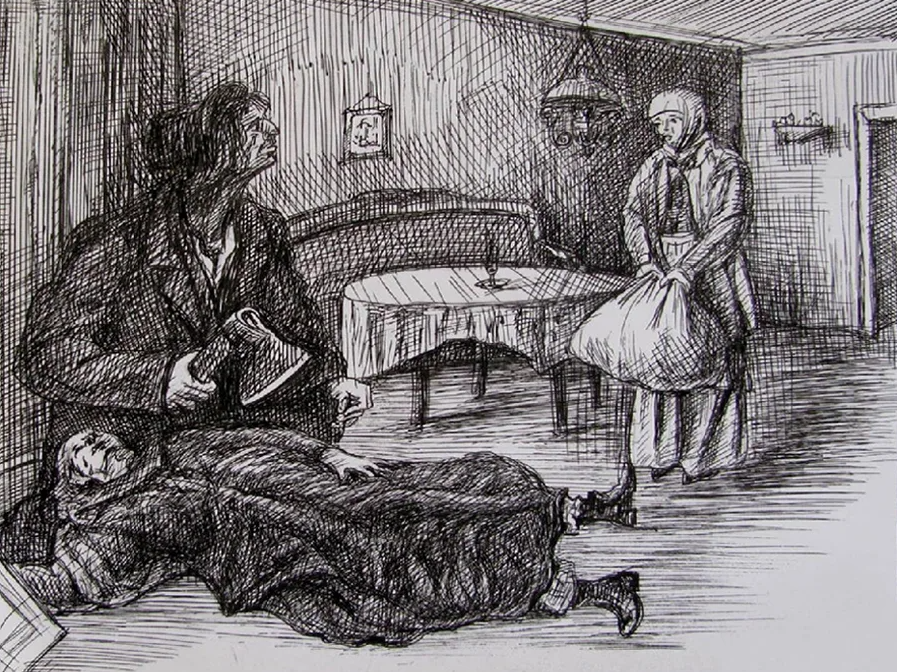
11.01.2023
In 1850 Dostoevsky was sent to hard labor in Omsk. It was this difficult experience that became the moment of origin of the idea of the novel “Crime and Punishment”.
Later, Fyodor Mikhailovich wrote to his brother: “Don’t you remember, I told you about one confession -a novel that I wanted to write after all, saying that I still have to go through myself. The other day I absolutely decided to write it immediately. My whole heart will put its blood into this novel. I conceived it in hard labor, lying on a bunk, in a difficult moment of sadness and self-destruction…”. Reflecting on the novel, the writer was going to build a narrative in a confessional form on behalf of the main character. All the worries, torments, mental tossing, hard labor experience had to become the basis of the work. But the emphasis was placed not only on the deep personal experiences of Rodion Raskolnikov, but also on the behavior and personalities of other characters — strong ones who have corrected the long-term beliefs of the hero. Physical fatigue, the difficult life of an exiled convict did not allow him to begin the work in Omsk. However, the writer has already thought over the plot of the future work well. Not only a crime, not only a punishment, but the whole life of the people of the nineteenth century in its undisguised and sometimes unsightly reality: “My whole heart will put its blood into this novel.” Despite the fact that the idea of the book was hatched for several years, the main idea about an ordinary and extraordinary person was born only in 1863 in Italy.
Having made a deal, Dostoevsky paid off his creditors and went abroad. But, being a gambler, in just five days the writer lost all his money and again found himself in a difficult situation. In the place where he was staying at that time (Wiesbaden, Germany), due to the fact that the guest turned out to be insolvent, the owners of the hotel refused him first dinners, and then light. That’s when the time came to create a novel: in the absence of light and food, Dostoevsky began working on a book that would become one of the greatest in world literature. In order to have time to finish the novel by the deadline, Dostoevsky had to work very hastily. He writes about his work that it is “a psychological report of a crime.” It was here, in the hotel, that the idea of the novel changed — it was no longer just a confession of a man who had committed a crime. The writer added events that had already been invented and described about the difficult fate of one family — this is how the story of Marmeladov appeared in the novel “Crime and Punishment”. As a result, the author himself became the narrator, and not the killer character.

It is believed that the plot about the murder of an old interest-bearing woman with an axe was prompted to the writer by a real crime. In January 1865, Gerasim Chistov, a twenty-seven-year-old resident of Moscow, a schismatic by his religious beliefs, killed two elderly women with an axe and stole valuables and money. It is known that Dostoevsky was familiar with the report on this case and, apparently, took as a basis the history of this crime. The author explained the reason for the murder committed by Raskolnikov simply: the old woman was stupid and evil, useless to anyone, and her money could have saved the young man’s relatives and friends.
Source: https://rosuchebnik.ru/material/istoriya-sozdaniya-romana-laquo-prestuplenie-i-nbsp-nakazanie-raquo/The writing process In November 1865, Dostoevsky declared the written material unfit and destroyed the records, starting writing again. Now a new thought has been added to the previous ideas. Raskolnikov does not just want to kill and rob an old woman, by his act he literally wants to benefit others: “I am not the kind of person to allow a scoundrel a defenseless weakness. I’ll intercede. I want to intercede.” Since the deadline for submitting the work to the publisher has come, and the novel was not ready, Dostoevsky is interrupted to write his other novel, The Gambler. Having thus fulfilled the promise given to the publisher, Fyodor Mikhailovich returns to “Crime and Punishment”. A month later, the writer presented the initial pages of the novel to the publisher of the magazine “Russian Bulletin” M. Katkov and then sent the novel in parts as it was written. In 1866, the Russian Bulletin published the first part of the book. The finale of the novel was not easy for the author. Raskolnikov became a complex character, the motives of his actions became more complicated, the character seemed to split. Rodion both loved people and hated them.What was printed in the magazine was a great success with readers.
The novel was completed in Russia in the sister’s estate near Moscow. By the end of the year, the work was completed. There are many notes left in Fyodor Mikhailovich’s workbooks that allow us to comprehend the full depth of the author’s reflections and torments. The writer chose whether to leave the duality of character to Raskolnikov or not. Deciding that the hero in his “throwing” is more complete, Dostoevsky emphasized the change of characters and views of the young man. It was in the final version of the novel that the Napoleonic idea of “trembling creatures” and “lords” appeared. Now Raskolnikov is no longer just a savior, but also a vain man, hungry for power: “I take power, I get power — whether money, power or not – not for bad. I bring happiness.”




